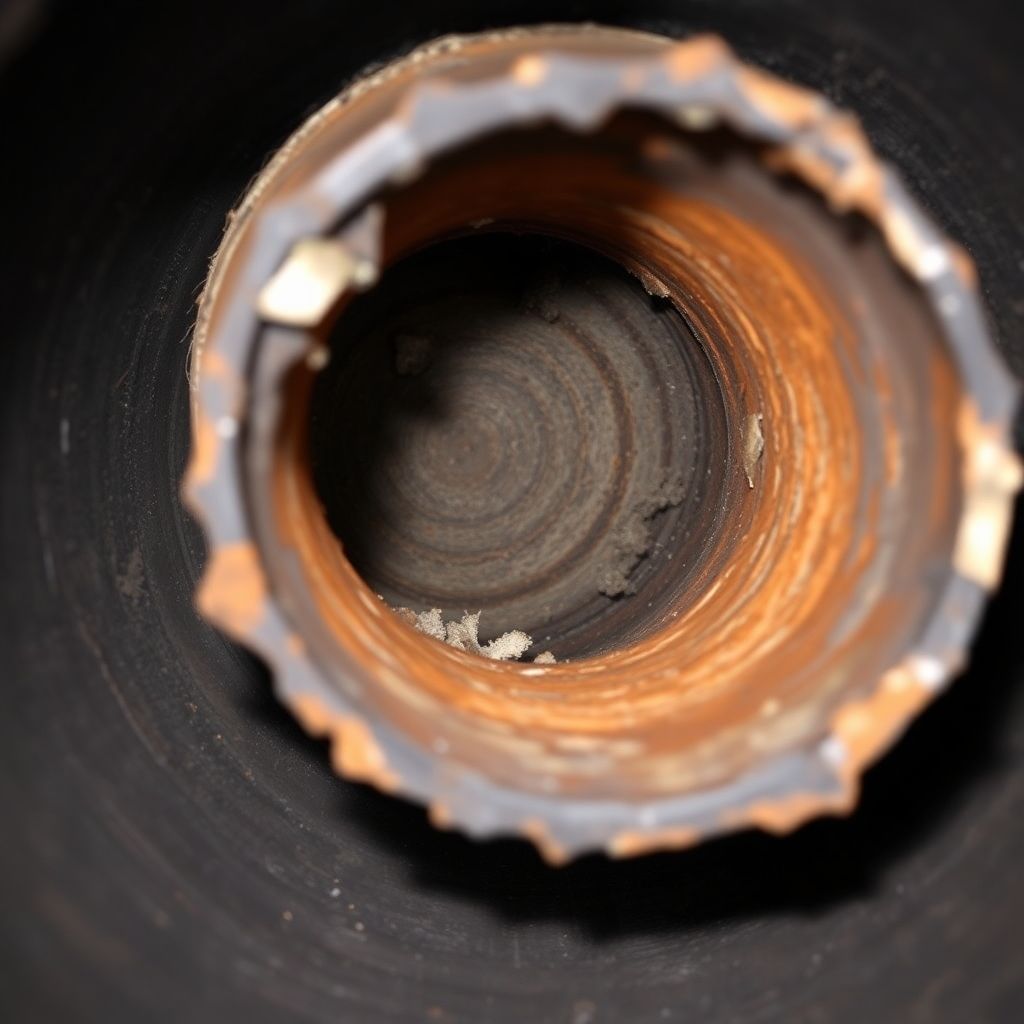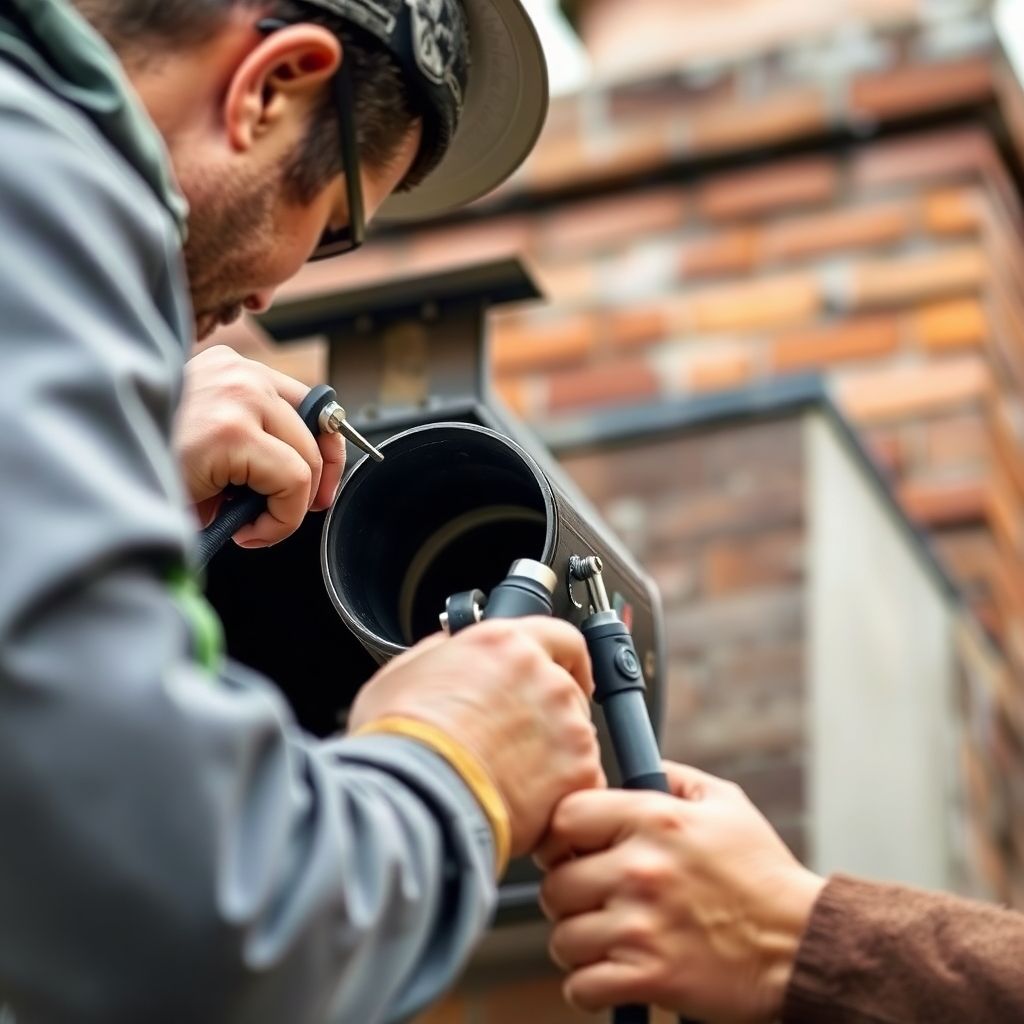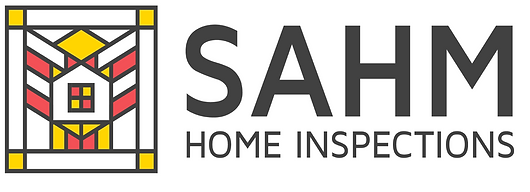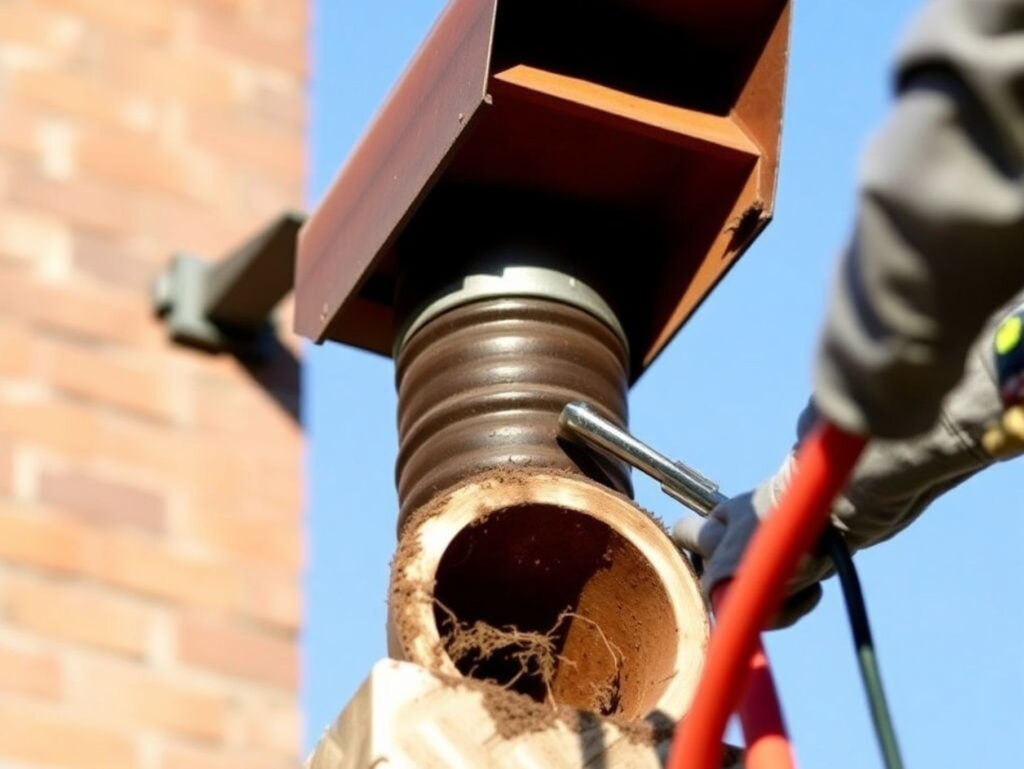Key Takeaways
-
Regular chimney flue inspections can help prevent dangerous fires caused by creosote buildup.
-
Inspecting your chimney can avoid hazardous carbon monoxide exposure and ensure proper ventilation.
-
Routine inspections can save you money on repairs by catching issues early.
-
Improving airflow efficiency through inspections can enhance the performance of your fireplace.
-
Annual inspections help maintain safety standards and can increase your home’s value.
Prevent Potential Fires

Understanding Chimney Fire Risks
Chimney fires are a real danger, and it’s something I never really thought about until I started doing some research. Turns out, there are around 20,000 chimney fires every year in the US. That’s a lot! The main thing to understand is that these fires aren’t just little flurries of flame; they can be intense and spread quickly. They can cause serious damage to your home and, more importantly, put your family at risk. It’s definitely worth taking seriously.
The Role of Creosote Buildup
So, what causes these fires? Well, the big culprit is creosote. It’s a byproduct of burning wood, and it’s this sticky, tar-like stuff that builds up inside your chimney. The more you use your fireplace, the more creosote you get. And here’s the kicker: creosote is highly flammable. If enough of it builds up, even a small spark can set it off, leading to a full-blown chimney fire. It’s like having a pile of kindling sitting right inside your chimney, waiting for a match. Regular cleaning is key to preventing this.
Importance of Professional Cleaning
Okay, so we know creosote is bad. What can you do about it? That’s where professional chimney cleaning comes in. I know, it sounds like a chore, but it’s super important. A professional chimney sweep has the tools and knowledge to safely remove creosote buildup. They can also spot any other potential problems with your chimney, like cracks or blockages. Think of it like getting your car serviced – it’s preventative maintenance that can save you a lot of trouble down the road. Plus, it gives you peace of mind knowing your chimney is safe to use.
Getting your chimney professionally cleaned isn’t just about removing creosote; it’s about ensuring the overall safety and efficiency of your fireplace. It’s an investment in your home and your family’s well-being.
Here’s a quick rundown of why professional cleaning is so important:
-
Removes dangerous creosote buildup.
-
Identifies potential structural issues.
-
Ensures proper airflow and ventilation.
-
Reduces the risk of chimney fires.
Avoid Hazardous Carbon Monoxide Exposure
Fires in your fireplace aren’t just about warmth and ambiance; they also produce gases, some of which are incredibly dangerous. Carbon monoxide (CO) is a silent killer – odorless, colorless, and potentially deadly. A chimney that isn’t working correctly can leak this gas into your home, putting you and your family at risk. That’s why regular chimney inspections are so important.
Identifying Carbon Monoxide Risks
Carbon monoxide is produced when fuels like wood, gas, or oil don’t burn completely. Normally, your chimney vents these gases safely outside. However, if there’s a blockage or damage to the chimney, CO can seep into your living space. Faulty appliances connected to the chimney, like furnaces or water heaters, can also be a source of CO leaks. It’s not always obvious when there’s a problem, which makes regular inspections so important.
How Inspections Prevent Downdrafts
A chimney inspection can identify issues that cause downdrafts. A downdraft happens when the flow of air reverses, pushing smoke and gases back into your home instead of up and out. Obstructions like bird nests, creosote buildup, or even structural damage can cause this. Inspectors can spot these problems and recommend solutions to ensure proper airflow.
The Importance of Proper Ventilation
Proper ventilation is key to preventing CO buildup. A well-functioning chimney creates a draft that pulls air and gases upwards. If the chimney is blocked or damaged, this draft is compromised.
Regular inspections ensure that your chimney is properly ventilated, reducing the risk of carbon monoxide exposure. This includes checking for blockages, ensuring the flue is intact, and verifying that the chimney is the right size for your fireplace or appliance. It’s a small investment that can make a big difference in your family’s safety.
Benefits of Regular Inspections
Think of chimney inspections like checkups for your house. You wouldn’t skip your own doctor’s appointment, right? Same goes for your chimney! Getting it checked regularly can save you a lot of trouble down the road.
Early Detection of Issues
Catching problems early is a huge win. It’s way easier (and cheaper) to fix a small crack than to deal with a crumbling chimney. Regular inspections can spot minor issues before they turn into major headaches. It’s like preventative medicine for your home.
Cost Savings on Repairs
Speaking of cheaper, think about the long-term savings. A small repair now can prevent a massive, expensive overhaul later. Ignoring a problem won’t make it go away; it’ll just get worse and cost you more in the end.
Extending the Lifespan of Your Chimney
Regular maintenance keeps your chimney in good shape, which means it’ll last longer. Think of it like this: a well-maintained car runs better and lasts longer than one that’s neglected. The same principle applies to your chimney. Plus, a chimney in good condition is safer for your home and family.
Regular inspections aren’t just about avoiding problems; they’re about ensuring the safety and longevity of your home. It’s a small investment that pays off big time in peace of mind and reduced repair costs.
Improve Airflow Efficiency

Identifying Obstructions
One of the most common reasons for poor chimney performance is simple: blockages. Things like leaves, twigs, and even animal nests can build up inside your chimney, especially near the top around the chimney cap. These obstructions restrict the flow of air, which can have a big impact on how well your fireplace or heating system works. It’s not just about annoying smoke; it’s about safety and efficiency.
The Impact of Blockages on Performance
When your chimney is blocked, it can cause a whole host of problems. The most immediate issue is reduced draft, which means smoke and fumes aren’t being pulled up and out of your home as effectively. This can lead to smoke backing up into your living space, creating a smoky, unpleasant environment. But it’s not just about comfort; poor draft can also increase the risk of carbon monoxide poisoning, a serious health hazard. Plus, a blocked chimney makes your heating system work harder, wasting energy and increasing your heating bills.
Maintaining Optimal Draft
Keeping your chimney clear is key to maintaining optimal draft and ensuring your heating system works efficiently and safely. Here are a few things you can do:
-
Regular Inspections: Schedule annual chimney inspections to identify and remove any blockages before they become a major problem.
-
Chimney Cap Maintenance: Make sure your chimney cap is in good condition and properly installed to prevent debris and animals from entering the chimney.
-
Professional Cleaning: Have your chimney professionally cleaned to remove creosote and other buildup that can restrict airflow.
A clean and unobstructed chimney is a happy chimney. By taking the time to maintain your chimney, you can ensure it functions properly, keeping your home safe and warm.
Identify Structural Deficiencies

Signs of Deterioration
Chimney inspections aren’t just about preventing fires; they’re also about spotting problems before they become major headaches. One of the most important things a chimney inspection does is identify any structural issues that could compromise the chimney’s integrity. Look for things like cracks in the brickwork, missing mortar, or even signs of water damage. These might seem small at first, but they can quickly turn into bigger, more expensive problems if left unchecked.
The Importance of Masonry Inspections
If you’ve got a masonry chimney, it’s especially important to get it checked out regularly. Masonry, whether it’s brick or stone, is porous. That means it can absorb water, and when that water freezes and thaws, it can cause the masonry to crack and crumble. A good inspection will look closely at the masonry to identify any signs of damage, like:
-
Cracks in the bricks or stones
-
Missing or crumbling mortar
-
Spalling (when the surface of the masonry flakes off)
Ignoring these signs can lead to serious structural problems, potentially requiring extensive and costly repairs down the road. Regular inspections help catch these issues early, saving you money and ensuring the safety of your home.
Preventing Costly Repairs
Think of a chimney inspection as preventative maintenance for your home. By catching small problems early, you can prevent them from turning into big, expensive ones. For example, a small crack in the chimney crown (the concrete slab at the top of the chimney) can let water in, which can then damage the entire chimney structure. Fixing that crack early on is a lot cheaper than rebuilding the whole chimney. Here’s a quick look at potential savings:
|
Issue
|
Cost of Early Repair
|
Cost of Major Repair
|
|---|---|---|
|
Small Crack
|
$100 – $300
|
$1000+
|
|
Missing Mortar
|
$200 – $500
|
$2000+
|
|
Minor Water Damage
|
$300 – $700
|
$3000+
|
Uphold Safety Standards

Understanding Local Regulations
It’s easy to overlook, but chimney inspections help you stay on the right side of local laws. Many areas have specific rules about chimney maintenance and safety. These regulations are there for a reason – to keep everyone safe. Ignoring them can lead to fines or even legal trouble. A chimney inspection ensures you’re meeting all the requirements.
The Role of Certified Professionals
When it comes to chimney inspections, you want someone who knows what they’re doing. That’s where certified professionals come in. They have the training and experience to spot problems that an untrained eye might miss. Hiring a certified inspector means you’re getting a thorough and reliable assessment of your chimney’s condition. They can provide documentation for insurance purposes, too.
Compliance with National Fire Codes
National fire codes set the standard for chimney safety across the country. These codes cover everything from chimney construction to maintenance. A chimney inspection helps ensure your chimney meets these standards, reducing the risk of fire and other hazards. It’s about more than just following the rules; it’s about protecting your home and family.
Keeping your chimney in good shape isn’t just a good idea; it’s often a legal requirement. Regular inspections help you avoid fines and ensure your home meets safety standards. It’s a small price to pay for peace of mind.
Enhance Home Value
Impact on Property Insurance
Keeping your chimney in good shape can actually affect your property insurance. Insurance companies want to see that you’re taking care of your home, and a well-maintained chimney shows just that. If you have regular inspections and fix any problems that come up, it can help prevent claims down the road. This might even lead to lower premiums because you’re seen as less of a risk. It’s all about showing you’re proactive about home maintenance.
Attracting Potential Buyers
When you’re selling your house, everything needs to look its best, right? A chimney that’s in good condition is a big plus for potential buyers. No one wants to move into a new place and immediately have to deal with chimney repairs. A clean, well-maintained chimney signals that the home has been cared for. It’s one less thing for buyers to worry about, and it can make your property more attractive compared to others on the market. Plus, it shows you’ve been responsible with upkeep, which buyers appreciate.
Maintaining Curb Appeal
Your chimney is a visible part of your home, and its condition contributes to the overall curb appeal. A chimney that’s crumbling or has obvious damage can be a real eyesore. Keeping it in good repair, with clean masonry and a functional cap, makes your home look better from the street. This is important because curb appeal is the first impression people get of your property. A well-maintained chimney adds to that positive impression and can even increase the perceived value of your home.
Think of your chimney like any other part of your house – regular maintenance not only keeps it working safely but also protects and even increases your home’s overall worth. It’s an investment that pays off in the long run.
Seasonal Preparation for Winter
Timing Your Inspections
Okay, so you’re thinking about when to get your chimney checked out? Most folks think about this right before they fire up the fireplace for the first time when it gets cold. But, honestly, the best time to schedule a chimney inspection is actually in the spring or summer. Why? Well, chimney sweeps are usually less busy then, so it’s easier to book an appointment. Plus, if they find any problems, you’ve got plenty of time to get them fixed before winter hits. Getting it done early means you’re not scrambling when the temperature drops.
Preparing Your Chimney for Use
Before you light that first fire of the season, give your chimney a little TLC. Clear away any debris like leaves or bird nests from the top of the chimney. Make sure the damper opens and closes smoothly. If you didn’t get a professional inspection, at least take a good look inside the firebox and up the flue as far as you can see with a flashlight. Look for any signs of damage or buildup. It’s also a good idea to burn a few small, hot fires at first to help season the chimney and get everything warmed up gradually.
Avoiding Winter Hazards
Winter can be tough on chimneys. The constant freezing and thawing can cause cracks and other damage. Make sure your chimney cap is in good shape to keep out rain and snow. Also, be mindful of how often you’re using your fireplace. Burning too much wood too quickly can lead to creosote buildup, which is a major fire hazard.
Regular chimney maintenance isn’t just about keeping your house warm; it’s about keeping your family safe. A little bit of preparation can go a long way in preventing serious problems down the road.
Here’s a quick checklist to keep in mind:
-
Schedule an inspection in the spring or summer.
-
Clear away any debris before the first fire.
-
Use seasoned wood to reduce creosote buildup.
Educating Homeowners on Maintenance
Common Misconceptions
So, you’ve got a chimney. Great! But do you really know how to take care of it? A lot of people don’t, and that’s where the problems start. One big misconception is that if you don’t use your fireplace often, you don’t need to worry about chimney maintenance. Wrong! Creosote builds up even with occasional use, and critters can still make a home in there. Another myth? Thinking that a quick sweep with a brush from the hardware store is enough. Nope, professional inspections go way beyond that, checking for structural issues and hidden dangers.
Best Practices for Chimney Care
Okay, let’s get down to brass tacks. What should you actually do to keep your chimney in good shape? Here’s a quick rundown:
-
Schedule annual inspections: Seriously, don’t skip this. A pro can spot problems you’d never see.
-
Burn seasoned wood: Wet wood creates more smoke and creosote.
-
Consider the type of fireplace: Gas fireplaces also need inspections.
Regular maintenance is key to preventing costly repairs and ensuring your family’s safety. It’s not just about keeping the fire burning; it’s about keeping your home safe.
Resources for Homeowners in Oak Park, IL
Living in Oak Park, IL, you’ve got some great resources at your fingertips. The Oak Park Fire Department can provide information on local fire safety codes and regulations. Also, there are several certified chimney sweeps in the area. Always check for certifications from organizations like the Chimney Safety Institute of America (CSIA) to ensure you’re working with a qualified professional. Don’t be afraid to ask for references and check online reviews before hiring someone. A little research can go a long way in protecting your home and family.
Keeping your home in good shape is important, and knowing how to take care of it can save you money in the long run. We want to help homeowners learn about simple maintenance tasks that can keep their homes safe and comfortable. For more tips and resources, visit our website today!
Wrapping It Up
In the end, getting your chimney flue inspected every year is just plain smart. It keeps your home safe from fires and stops dangerous gases like carbon monoxide from sneaking in. You might think your chimney looks fine, but there could be hidden issues that could cost you big time later. Regular inspections help catch problems early, saving you money and headaches down the road. So, don’t skip that annual check-up. It’s a small step that can make a huge difference for your family’s safety and your home’s health.
Frequently Asked Questions
How often should I have my chimney inspected?
You should get your chimney inspected at least once a year to keep it safe and working well.
What can happen if I don’t inspect my chimney?
If you skip inspections, you risk chimney fires and harmful gases, like carbon monoxide, entering your home.
What is creosote and why is it a problem?
Creosote is a flammable substance that builds up in your chimney. If it gets too thick, it can catch fire.
How can I tell if my chimney needs cleaning?
If you see dark soot or smell a strong burning smell when using your fireplace, it’s time to clean your chimney.
Can I clean my chimney myself?
It’s best to hire a professional. They have the tools and knowledge to clean it safely and effectively.
What are the signs of chimney damage?
Look for cracks, crumbling bricks, or loose parts. These can indicate serious problems.
Why is it important to have a certified chimney professional?
Certified professionals know the safety rules and can spot issues that an untrained person might miss.
How can regular chimney inspections save me money?
By catching problems early, you can avoid expensive repairs later and keep your heating system efficient.

